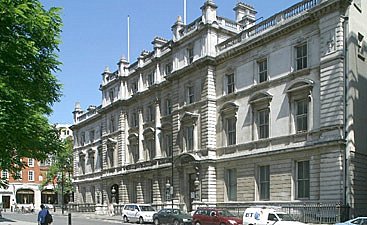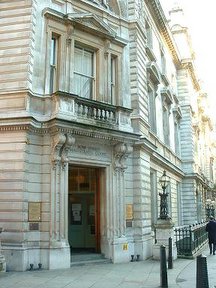
A prominent piece of British criminal history will become history itself tomorrow, when London’s Bow Street Magistrates’ Court closes its doors, after almost 270 years of operation, to be converted into--of all things--a boutique hotel.
The Victorian building itself (shown above) isn’t quite that old; it was completed in 1881 (two years behind schedule, apparently), on property leased from the Duke of Bedford. But there has been a court operating in Bow Street, near Covent Garden, ever since the late 1730s, when Sir Thomas de Veil set himself up as a magistrate in a house on the opposite side of the road (the site of today’s Royal Opera House). In 1747, novelist Henry Fielding (Tom Jones) took possession of that residence when he became a justice of the peace. A year later, Fielding was appointed a magistrate, and set about ridding the thoroughfare of its plague of gin shops, which he believed contributed to the area’s high crime rates. If that tactic worked, it obviously didn’t work well enough: Two years later, in answer to public demands that theft and other devilry in the district remained unacceptably common, the author-magistrate assembled a contingent of eight trusted constables, and sent them out to purge vice from the neighborhood. These law enforcers were originally nicknamed “Robin Redbreasts,” due to the scarlet hue of their waistcoats, but they eventually became known as Bow Street Runners.
 Prior to that time, criminals were generally apprehended in London--when they were apprehended at all--by “thief-takers,” men of frequently dubious reputation (such as the notorious Jonathan Wild) who solicited rewards for solving petty crimes, nabbing malefactors, and returning stolen goods to their rightful owners. What made the “runners” different, was their official association with the Bow Street court, which also paid for their services, sometimes sending them across Britain in order to arrest felons. They were the forerunners of today’s professional police force, and Fielding used them as aggressively as he could. When he died in 1754, his younger brother, Sir John Fielding (known as the “Blind Beak of Bow Street,” because he’d lost his sight in a navy mishap at age 19), who’d served as Henry’s assistant for nine years, replaced him as magistrate. Between them, they instituted a variety of innovations to curb London’s multitudinous criminal enterprises. According to a useful online history of London policing, the Fieldings “collected and disseminated information about crimes and suspected criminals, making their Bow Street office the centre of a criminal intelligence network; and they organised horse and foot patrols of major roads by part-time paid constables in order to prevent robberies and other serious crime.” Sir John died in 1790 (though he’s since been “revived,” in a sense, as a prominent player in two different crime-fiction series--one by Bruce Alexander [Rules of Engagement, The Price of Murder], the other by Deryn Lake [Death in the Valley of Shadows]). Not until 1829 did British Home Secretary Sir Robert Peel establish London’s Metropolitan Police Service (aka “Scotland Yard”).
Prior to that time, criminals were generally apprehended in London--when they were apprehended at all--by “thief-takers,” men of frequently dubious reputation (such as the notorious Jonathan Wild) who solicited rewards for solving petty crimes, nabbing malefactors, and returning stolen goods to their rightful owners. What made the “runners” different, was their official association with the Bow Street court, which also paid for their services, sometimes sending them across Britain in order to arrest felons. They were the forerunners of today’s professional police force, and Fielding used them as aggressively as he could. When he died in 1754, his younger brother, Sir John Fielding (known as the “Blind Beak of Bow Street,” because he’d lost his sight in a navy mishap at age 19), who’d served as Henry’s assistant for nine years, replaced him as magistrate. Between them, they instituted a variety of innovations to curb London’s multitudinous criminal enterprises. According to a useful online history of London policing, the Fieldings “collected and disseminated information about crimes and suspected criminals, making their Bow Street office the centre of a criminal intelligence network; and they organised horse and foot patrols of major roads by part-time paid constables in order to prevent robberies and other serious crime.” Sir John died in 1790 (though he’s since been “revived,” in a sense, as a prominent player in two different crime-fiction series--one by Bruce Alexander [Rules of Engagement, The Price of Murder], the other by Deryn Lake [Death in the Valley of Shadows]). Not until 1829 did British Home Secretary Sir Robert Peel establish London’s Metropolitan Police Service (aka “Scotland Yard”).Over the course of its history, the Bow Street Magistrates’ Court hosted a literal rogues’ gallery of recalcitrant “guests.” They ranged from adventurer and womanizer Giacomo Casanova (who was charged with intent to cause the “person of a pretty girl” dire bodily harm) and playwright-novelist Oscar Wilde (arrested for “committing acts of gross indecency with other male persons,” and eventually sentenced to two years of hard labor), to Hawley Crippen (accused of slaying his wife and burying her dismembered body in their basement--he was later hanged) and organized East End crime bosses Ronald and Reginald Kray. General Augusto Pinochet, who had headed Chile’s military dictatorship from 1973 to 1990, never actually set foot at Bow Street. However, it was there, in 1998, that a judge upheld Spain’s order to extradict Pinochet--who’d been arrested while traveling in Great Britain--on 94 counts of torturing Spanish citizens in Chile, and one count of conspiracy to commit torture. (The Chilean government opposed this order, and--with help from then-President George H.W. Bush and British Prime Minister Margaret Thatcher--the allegedly too-sick-to-stand-trial Pinochet was allowed to return to Chile. Pinochet remains alive today.)
Despite its status as a law-enforcement landmark, in 2005 this Victorian building’s owners, the Greater London Magistrates Courts Authority and the Metropolitan Police Authority, sold the famous edifice to Irish property developer Gerry Barrett, of Galway-based Edward Holdings. (Barrett and company also purchased the neighboring Bow Street Police Station). Their plan is to transform it into a luxury hotel and museum called, appropriately, The Bow.
Hey, can you hear that sound? It’s the Fielding brothers spinning in their frickin’ graves.



0 Yorumlar